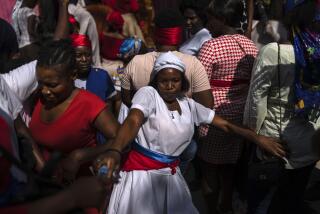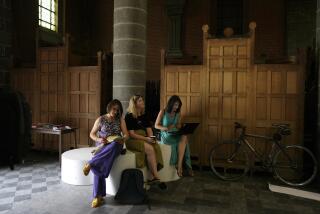World Perspective : Religion : Liberians Put Faith in Church : Beset by violence, corruption and poverty, many in postwar nation are turning to God.
- Share via
MONROVIA, Liberia — There’s a new sight to see on the streets of this squalid, bullet-scarred capital: row after row of religious institutions.
New Life Victory Church. The Spiritual Leading Church. Faith and Victory Church. Deeper Life Bible Church. International Gospel Ministry.
“On every corner, there is a little church going on,” said William Nah Dixon, a bishop who heads Liberia’s Council of Churches. “Religion in general has really taken root in every direction.”
The quest for spirituality has boomed since this country’s devastating seven-year civil war formally ended in 1997, local religious leaders say.
The fighting--which killed more than 200,000 people and displaced at least half the prewar population of 2.5 million--has eased. But a host of other troubles has sent Liberians seeking comfort in religion:
Crime, insecurity and random violence persist. The country’s infrastructure has collapsed, and unemployment is skyrocketing. Government transgressions, including corruption, intimidation, executions and torture, have caused many to lose faith in the administration of President Charles Taylor, the former warlord who rose to power in 1997.
“Because there is a lack of faith in the law, because of widespread impoverishment and the economic alienation of large segments of the population, the options have become very limited,” said Conmany Wessah, executive director of the Center for Democratic Empowerment in Monrovia. “People are resorting to prayers.”
“[They] tend to go to church to pour out their grief and for consultation,” said Dixon, the bishop.
He estimated that the number of churches in Monrovia had quadrupled to at least 200 since the war ended. A slew of recently established Bible schools has been churning out preachers, who sprout their own churches.
Some preachers feel that many of their colleagues are only interested in cashing in on the widespread need for solace. “Many people now see church as a way of making money,” said Joseph Kun, pastor at Monrovia’s City of Light Church of God.
Once established as an official church, an institution becomes tax-exempt. Donations on the collection plate could be pocketed by an unscrupulous pastor.
The charismatic nature of evangelism has attracted a wide array of worshipers, including many ex-combatants, in this West African nation founded by freed American slaves, where Christianity is the official religion. Anecdotal evidence shows that most new converts are younger than 30.
“I felt tired of not living in control of my own life,” said Charles Vincent Johnson, 23, who has been ministering at the Deliverance Center Ministries for the past three years. “So I decided to accept Christ.”
Sam Nunoo, 26, pastor at the Faith World Outreach Mission, said older clerics fear that their junior counterparts are more likely to capture the hearts--and tithes--of the younger set.
“There is a lot of jealousy and competition,” Nunoo said. “That’s why you see so many churches.”
So desperate are some people to find comfort that many are drawn to suspect sects such as the Never Die Church.
This group promises eternal life and, in return, requires members to share everything, including sexual partners; practice incest; and reject vices such as stealing, smoking, witchcraft, liquor, hatred--and politics.
Scores of its members were recently arrested on rape charges, spreading fear among church operators that their efforts to attract young congregants might fall under suspicion.
Still, many churchgoers insist that faith in God is the only remedy for transforming a wretched life.
“I used to be a drunkard and a womanizer . . . and I was involved in traditional juju [black magic] practices,” said Kun, 31, who embraced religion in 1990. “Now I’ve cut all [that] out of my life. It was only by His grace.”
More to Read
Sign up for Essential California
The most important California stories and recommendations in your inbox every morning.
You may occasionally receive promotional content from the Los Angeles Times.











